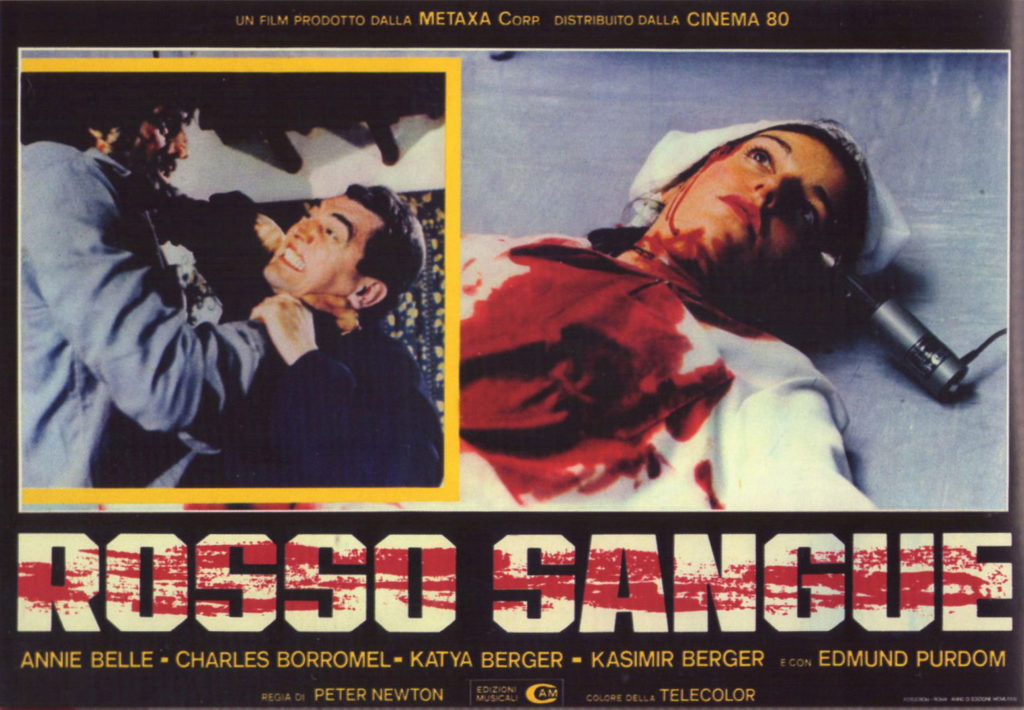As often happens in film, a project begins with one intention in mind, and ends up being something else. Such is the case with Absurd, one of eight films released by prolific filmmaker Joe D’Amato in 1981. Like with Anthropophagus in 1980, this is the only one of the year that wasn’t smut.
D’Amato had envisioned a film that would be a sequel to Anthropophagus, but frequent collaborator George Eastman, whom D’Amato tapped to star, decided to rewrite the whole thing into a Halloween ripoff, only with less plot. Why D’Amato, who also produced, decided to let Eastman change everything around, is anyone’s guess. D’Amato was the kind of filmmaker who wanted to get his movies into the can as quickly as possible, so just letting Eastman redo the screenplay might have been the path of least resistance. The problem is, while Eastman had an extensive list of credits as a screenwriter at that point, none of it is any good.
As the film opens, viewers see Eastman, as a character named Mikos Stenopolis, stumbling through the woods with Edmund Purdom (whom viewers may remember from the wild Don’t Open Till Christmas) following along in pursuit. Mikos makes his way to a suburban home, but injures himself climbing over the fence. He knocks and, to the horror of those who open the door, falls into the foyer while cradling his intestines in his hands.
The next stop is the hospital, where surgeons hold no hope for Mikos, except for the fact his body shows amazing recuperative powers, the likes of which the medical staff has never seen before.
Meanwhile, Purdom is picked up by the police, and he turns out to be a priest from Greece, who has been pursuing Mikos all the way from Europe. As the priest tells it, Mikos is an escapee from a laboratory that was carrying out experiments of some kind. The details are not important, nor are they provided by the film. Suffice it to say, the experiments have made Mikos impossible to kill, short of destroying the brain. He’s sort of a zombie, but this isn’t tonally a zombie flick. As per Eastman’s intentions, he’s a Michael Myers type.
Mikos makes a bloody escape from the hospital. Then, for reasons that make no sense, he returns to the house from the first act, where he kills anyone he sees until denouement.
I’m not joking. There is no reason given, ever, for Mikos’s interest in that house or its inhabitants. Out here in real life, it would have to be chalked up to unfortunate coincidence. But, in this movie’s world, D’Amato and company spent a good deal of this film  developing the characters in the house, only to never tie them in with a coherent plot. In this film, it just doesn’t work that the locus of events has no meaning. It would have been better to have Mikos pick an altogether different house to terrorize after the first act.
developing the characters in the house, only to never tie them in with a coherent plot. In this film, it just doesn’t work that the locus of events has no meaning. It would have been better to have Mikos pick an altogether different house to terrorize after the first act.
The intention seems to have been to create a slasher flick distilled down to its basest elements — as if it’s a depiction of senseless violence. That kind of violence does exist in the real world, and, as such, is worth exploring in film. But, not with a total lack of direction. Violence without reason is a genuine fear in society. That fear can be used by filmmakers for any number of ends, whether to make an audience look inward at society’s ills, or as a vehicle just to scare the bejesus out of them. It can offend, it can disturb, it can even enlighten someone inured by a lifetime of exposure to violent media. In Absurd, the senselessness of it all is just a mark of poor filmmaking.
Some of it is needlessly indulgent, as during a lengthy scene that cuts back and forth, over and over, from Mikos shoving a character into a lit oven head first, a teenaged girl undoing the straps that keep her confined to her bed upstairs in the house, and a young boy banging desperately on her door to be let in (It sounds like there’s some plot in there, but there isn’t. That’s just part of the wasted character development.). This scene goes on for over four excruciating minutes, and adds nothing of value.
Absurd is not an entertaining film, falling well into the lower half of the Shitty Movie Sundays Watchability Index, displacing The Expendables 3 at #347.
